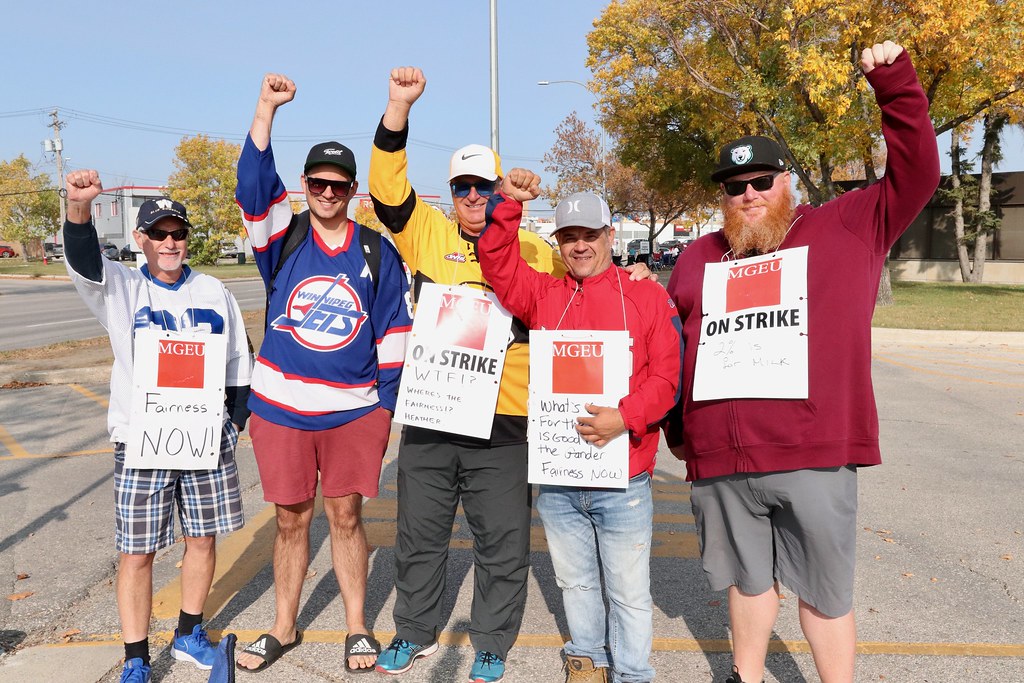Last summer, strikes by Manitoba public insurance workers and Liquor and Lotteries Manitoba brought the impact of scabs back to the forefront in the province. Replacement workers were hired by the state to replace driving instructors, call center agents and Liquor Mart salespeople, causing a sharp loss of bargaining power for the workers and an unnecessary prolongation of their strike. Despite the NDP being in power and constantly advocating for an official anti-scab stance, they have yet to implement any such law.
In Canada, only British Columbia and Québec have anti-scab laws in place. Ontario adopted similar legislation in 1992, but it was over-turned in 1995. They have introduced a new bill of that type again, though it is still in the early stages of being discussed. Manitoba has never had an anti-scab law, despite the Manitoba Federation of Labour’s (MFL) anti-scab campaign beginning in 1978.
Scott Price, Winnipeg Labour Historian, told The North Star that when Howard Pawley was Premier in the 1980s, “there was a lot of debate around anti-scab and this actually came up because of really long and brutal strikes. There was in ‘87 a strike at Superstore, at Westfair, and that was UFCW (United Food and Commercial Workers) and it was a long, long-drawn-out strike. It was probably some of the most intense picket lines in Manitoba since maybe the early nurses union strike in the ‘90s. The Superstore strike had mass arrests of workers, tons of animosity on the picket lines and people were seeing these issues, so parts of the labour movement were like, ‘Well we need anti-scab. It would be the most direct way to do it.'”
However, Scott Price told North Star that the more conservative elements of organized labour were saying “‘it’s something that the right-wing would go crazy over’ and there is this feeling that maybe the NDP would then get attacked for passing such a law.”
A law was passed in the 80s instead of anti-scab: Final Offer Selection. This gave an arbitrator the power to choose between either the union’s final offer or the employer’s. The passing of this bill split the labour movement in Manitoba as some unions were happy with Final Offer Selection such as UFCW, United Steel Workers, and the MGEU—at the time MGEA—while others were heavily against it such as Canadian Union of Postal Workers, Canadian Union of Public Employees, and other public sector unions.

 All rights reserved by badr09
All rights reserved by badr09Since, Manitoba has replaced Final Offer Selection with a similar law that allows either the union or employer to apply for binding arbitration after 60 days of strike action—once the application for arbitration has been made, the other party cannot refuse. If no arbitration has been applied for after 90 days total of strike action, both parties are taken to binding arbitration.
Scott Price told North Star that he believes an anti-scab proposal is endorsed at almost every Manitoba NDP convention. “Just this last convention, it was proposed and passed unanimously as far as I know.” However, the leader of the Manitoba NDP party and newly elected Premier of Manitoba, Wab Kinew, is quoted saying that an anti-scab law “makes sense” to him, but he believes that Manitobans don’t understand what it is and must be consulted before the NDP adopts anything.
Workers North Star spoke to on the various picket lines during the summer completely understood what an anti-scab law looked like and were curious why the NDP were “dragging their feet” in passing the law. Workers on the Manitoba Public Insurance picket lines said they received the visit of Wab Kinew for only 20 minutes, and during that time it was “clearly just a photo op for him.”

 All rights reserved by badr09
All rights reserved by badr09“In the case of a strike, workers are trying to exert […] one of the few controls that they have in a workplace, which is withdrawing their labour and going on strike. And a scab is directly working against those goals… Any of the workers I talk to who went through something like that, still even if it was decades ago, have a very visceral reaction when they start talking about the scabs.”
“It’s a direct economic, political and even psychological thing to use [scabs] against workers who are striking because if they can still operate their business or operations even while the workers are striking, it directly undermines the strikes. It’s very powerful way, especially if you think about it, if you’re on strike, and you’re trying to fight for a better deal, better working conditions for everyone, and you see people still going into work, making money while you’re not.”
“If you have a strike with a lot of scabs, the effects of that on the workforce goes on for years and years and years. Because you may go back to work, but you know the people who scabbed and they not only [broke the picket line] when you were out, they were making more money. They then come back and get to work under the contract that you were fighting for while they were undermining it.”
Scott Price concluded the interview with thoughts on how to get an anti-scab law passed: “I think workers would just have to organize to push for that [anti-scabs] to happen and make those arguments. Both inside and outside the labour movement.”
Organizations in Manitoba are pushing for anti-scab, such as the MFL and the 1919 Workers Collective. Scott Price gave an educational with 1919 Workers Collective on the history of the anti-scab law in Manitoba. It is available on YouTube.

